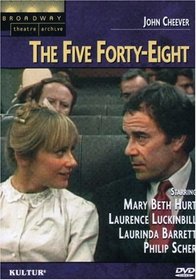| Actors: Laurence Luckinbill, Mary Beth Hurt, Laurinda Barrett, Dale Hodges, Kathy Keeney Director: James Ivory Creators: Andrzej Bartkowiak, J. Stephen Fairchild, Jac Venza, Noam Yerushalmi, Peter Weinberg, John Cheever, Terrence McNally Genres: Drama, Television, Musicals & Performing Arts Sub-Genres: Drama, Television, Broadway Theatre Archive Studio: Kultur Video Format: DVD - Color DVD Release Date: 11/26/2002 Theatrical Release Date: 05/08/1974 Release Year: 2002 Run Time: 0hr 58min Screens: Color Number of Discs: 1 SwapaDVD Credits: 1 Total Copies: 0 Members Wishing: 2 MPAA Rating: NR (Not Rated) Languages: English |
Search - The Five Forty-Eight (Broadway Theatre Archive) on DVD
  | The Five Forty-Eight Broadway Theatre Archive Actors: Laurence Luckinbill, Mary Beth Hurt, Laurinda Barrett, Dale Hodges, Kathy Keeney Director: James Ivory Genres: Drama, Television, Musicals & Performing Arts NR 2002 0hr 58min Tony-Award winning playwright Terrence McNally ("Love! Valour! Compassion!") adapted this short story by John Cheever for the Broadway stage. With haunting eloquence, director James Ivory (A Room With a View) presents the ... more » |
Larger Image |
Movie DetailsSimilar Movies
|
Movie Reviews"I only feel like myself when it begins to get dark." Mary Whipple | New England | 12/29/2004 (4 out of 5 stars) "Adapted from the short story by John Cheever, this Terrence McNally screenplay for Public Television, stars Lawrence Luckinbill as a self-centered business executive and Mary Beth Hurt as the mentally ill secretary he has hired, seduced, and then fired. Directed by James Ivory, this 1979 drama builds considerable suspense based upon the loathsome behavior of executive John Blake (Luckinbill), whose high-handed and egotistical treatment of his wife, son, neighbors, employees, and the vulnerable Jane Dent (Hurt) cause immense pain to everyone but himself. His level of cruelty knows no bounds.
Ivory directs this screenplay with split second timing. Not a single detail is irrelevant, no scenes last for more than a minute or two, and the camera focuses almost totally on Luckinbill (as Blake) and what passes for emotion on his face. Blake's cold-blooded seduction of a young woman who has just been released from eight months in a mental hospital, followed by her immediate firing and subsequent unemployment, sets in motion her stalking as she studies his schedule and ascertains that he takes the "five forty-eight" to Shady Hill every night. Hurt's radiance when she smiles is countered by her obvious vulnerability and neediness, and no viewer will fail to be moved by her performance. Telling Blake she "never had a true friend in my whole life," she announces that it is her "duty is to exterminate weak people...I want to help you." Produced in 1979, this fine production suffers a bit from the dated, chauvinistic character of Blake, who would have been an extreme example even in that time, but as an encapsulation of the period and record of the power some unprincipled employers wielded over their employees, the play and Blake's role stand on their own merits. James Ivory's direction keeps the tension at its peak, and repeating images of violence throughout the film keep the viewer constantly aware of the potential for disaster. Mary Whipple " |





